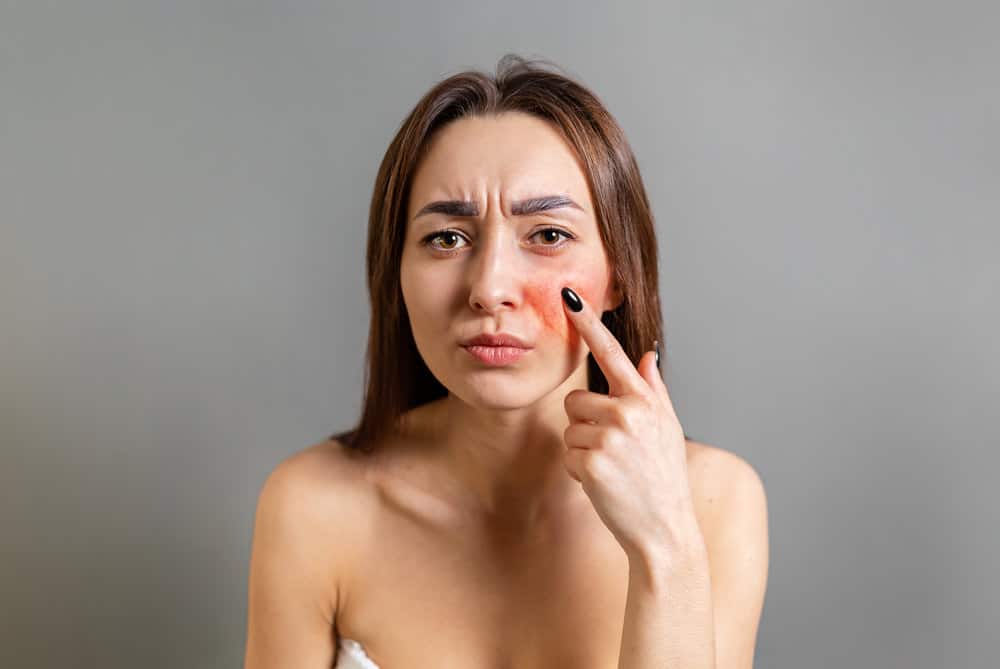
Overview
Everyone experiences flushing of the cheeks – can be from exertion, from embarrassment, or even from some foods and drinks. A flush that is persistent and won’t go away can be a sign of rosacea.
For middle-aged white women in particular, rosacea can come and go with no apparent reason or cure. It’s more likely to occur in women, but sometimes men can get it and it’s typically more severe.
Rosacea can develop at any age, but most patients are diagnosed after age 30 – redness that tends to start as frequent flushing can become longer-lasting and darker in color. There is some evidence of a genetic link since it tends to run in families, but there is no known cause. Some scientists suspect certain immune systems and environments can trigger rosacea.
For middle-aged white women in particular, rosacea can come and go with no apparent reason or cure. It’s more likely to occur in women, but sometimes men can get it and it’s typically more severe.
Rosacea can develop at any age, but most patients are diagnosed after age 30 – redness that tends to start as frequent flushing can become longer-lasting and darker in color. There is some evidence of a genetic link since it tends to run in families, but there is no known cause. Some scientists suspect certain immune systems and environments can trigger rosacea.
Signs & Symptoms
While a flush across the center of the face is a classic sign of rosacea, symptoms may also be swollen bumps that almost look like pimples, visible blood vessels, irritated eyes (ocular rosacea – may precede symptoms on the skin), an enlarged nose over time due to thickening of the skin (more often in men than women), and even a sensation of tingling, burning, or heat in the area of the face that is flushed.
Diagnosis
There are currently no definitive tests that will diagnose rosacea, but medical tests can help rule out other conditions, such as lupus. A dermatologist will examine your face (including eyes) and ask questions about the history of your symptoms in order to make a diagnosis.
Treatment
Treatment is focused on controlling the signs and symptoms of rosacea since there isn’t a cure. Rosacea that presents as bumps or pimples may receive oral and topical medications right away, including an anti-inflammatory.
Some medications are now specifically formulated for varying levels of rosacea so they can be individualized to each patient. Topical medications may help minimize flushing, such as one that constricts blood vessels (brimonidine) but has to be applied regularly. It provides results quickly (within 12 hours).
Some medications may take weeks to work effectively, particularly for treating the skin bumps seen in some cases of rosacea. A doctor may suggest acne medication, such as isotretinoin, when improvement isn’t seen from other medications.
Laser therapy can improve the appearance of large blood vessels, but is most effective on light skin. This treatment may not have visible results for weeks, and could require repeat treatments.
Daily, non-medicinal care can also be used to help treat rosacea, in addition to lifestyle changes. Those with rosacea should have a very gentle skin care routine and never use anything rough on the face. They should always use sunscreen to protect the skin from further damage, and never use any products that cause burning or stinging.
It’s helpful to try to identify triggers, such as flushing after eating or drinking certain things. Keeping a daily food and activity journal can help make triggers more clear.
Living with rosacea can be difficult, so seeking treatment and identifying triggers are a good starting point to treating the condition.
Some medications are now specifically formulated for varying levels of rosacea so they can be individualized to each patient. Topical medications may help minimize flushing, such as one that constricts blood vessels (brimonidine) but has to be applied regularly. It provides results quickly (within 12 hours).
Some medications may take weeks to work effectively, particularly for treating the skin bumps seen in some cases of rosacea. A doctor may suggest acne medication, such as isotretinoin, when improvement isn’t seen from other medications.
Laser therapy can improve the appearance of large blood vessels, but is most effective on light skin. This treatment may not have visible results for weeks, and could require repeat treatments.
Daily, non-medicinal care can also be used to help treat rosacea, in addition to lifestyle changes. Those with rosacea should have a very gentle skin care routine and never use anything rough on the face. They should always use sunscreen to protect the skin from further damage, and never use any products that cause burning or stinging.
It’s helpful to try to identify triggers, such as flushing after eating or drinking certain things. Keeping a daily food and activity journal can help make triggers more clear.
Living with rosacea can be difficult, so seeking treatment and identifying triggers are a good starting point to treating the condition.
Sources and More Information
American Academy of Dermatology Association, “Rosacea” https://www.aad.org/public/diseases/rosacea/treatment/diagnosis-treat
Mayo Clinic, “Rosacea” https://www.mayoclinic.org/diseases-conditions/rosacea/diagnosis-treatment/drc-20353820
National Institute of Arthritis and Musculoskeletal and Skin Diseases, “Rosacea Basics” https://www.niams.nih.gov/health-topics/rosacea/basics/symptoms-causes
National Rosacea Society, “All About Rosacea: Signs & Symptoms and Treatment” https://www.rosacea.org/patients/all-about-rosacea
Mayo Clinic, “Rosacea” https://www.mayoclinic.org/diseases-conditions/rosacea/diagnosis-treatment/drc-20353820
National Institute of Arthritis and Musculoskeletal and Skin Diseases, “Rosacea Basics” https://www.niams.nih.gov/health-topics/rosacea/basics/symptoms-causes
National Rosacea Society, “All About Rosacea: Signs & Symptoms and Treatment” https://www.rosacea.org/patients/all-about-rosacea

